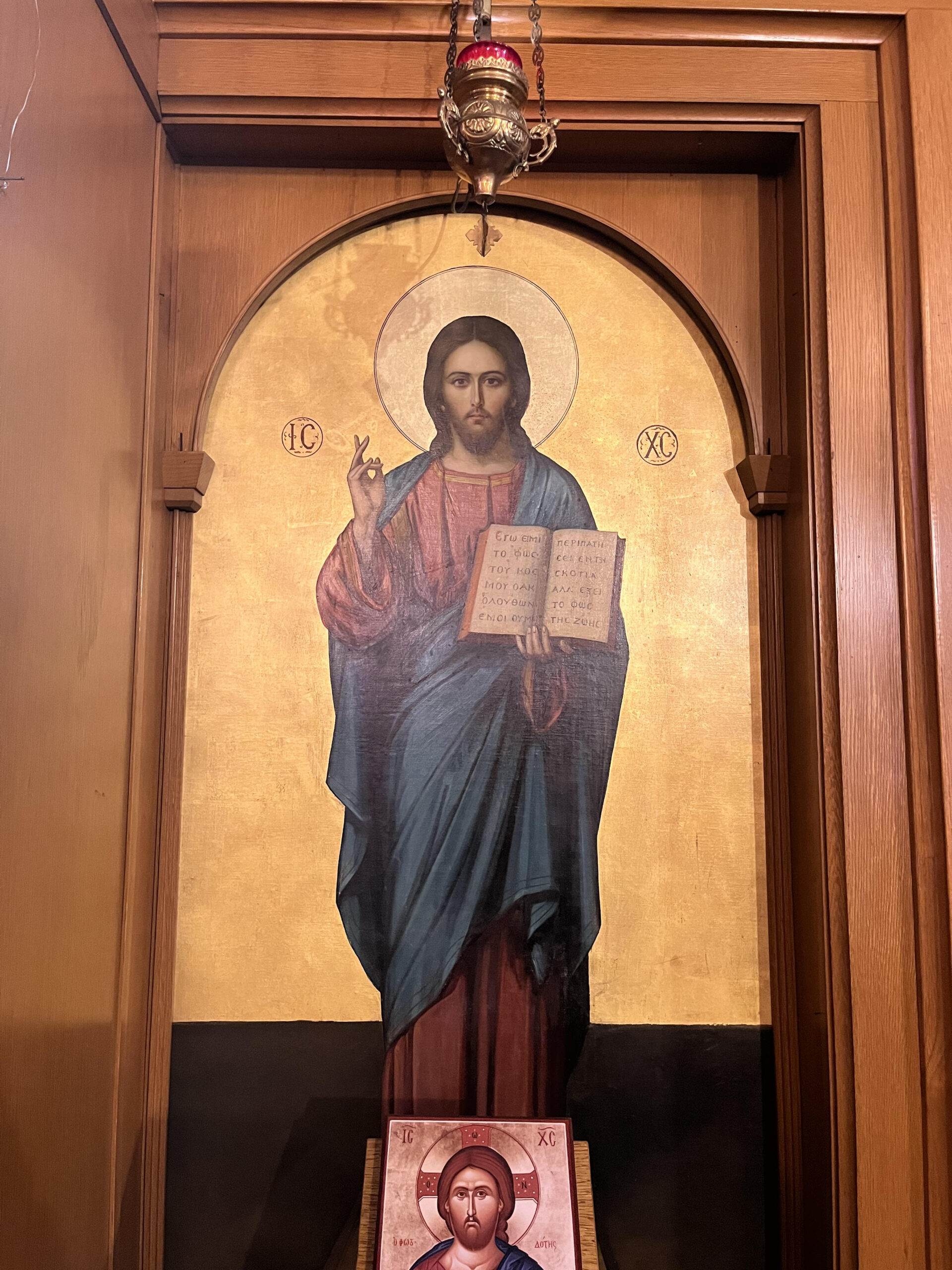The beginning of the gospel of Jesus Christ, the Son of God. As it is written in Isaiah the prophet, “Behold, I send my messenger before thy face, who shall prepare thy way; the voice of one crying in the wilderness: Prepare the way of the Lord, make his paths straight—” John the baptizer appeared in the wilderness, preaching a baptism of repentance for the forgiveness of sins. And there went out to him all the country of Judea, and all the people of Jerusalem; and they were baptized by him in the river Jordan, confessing their sins. Now John was clothed with camel’s hair, and had a leather girdle around his waist, and ate locusts and wild honey. And he preached, saying, “After me comes He who is mightier than I, the thong of whose sandals I am not worthy to stoop down and untie. I have baptized you with water; but He will baptize you with the Holy Spirit.”
Mark 1:1-8 (Gospel of the Sunday Before Theophany)
It is interesting to note that the Gospel of Mark is the only Gospel that does not begin by making reference to the Nativity. Saint Matthew lists the genealogy of Christ, followed by the birth of Jesus and the visit of the Magi. Saint Luke begins with the birth of John the Baptist, the Annunciation to the Virgin Mary, the birth of Jesus and the visit of the Shepherds. Saint John begins with an theological explanation of the Holy Trinity, noting in John 1:14 that “the Word became flesh and dwelt among us,” a reference to the Nativity.
Saint Mark begins his Gospel with the words of St. John the Baptist, announcing the coming of the Messiah. And in the verses that follow today’s selection of Scripture, Christ will be identified by God as the “beloved Son” (Mark 1:11) at the Baptism by John in the Jordan.
Looking at today’s Gospel reading, we read of the ministry of St. John the Baptist. God chose two very special people for two unique roles. The Virgin Mary was chosen by God to bear Christ in her womb, thus allowing Him to enter life as a baby. Saint John the Baptist was chosen to be the Forerunner of Christ, preparing the way, and ultimately identifying Jesus as the Christ. John lived a solitary life in the wilderness. He lived a very Godly life, however, and was bringing people closer to God through baptism, which at that time, was a ritual washing, similar to how we do confession, that the Jews came to do periodically. His basic message is found in verses 7-8, “After me comes He who is mightier than I, the thong of whose sandals I am not worthy to stoop down and untie. I have baptized you with water; but He will baptize you with the Holy Spirit.”
One phrase from today’s Gospel that always jumps out at me is “the voice of one crying in the wilderness.” (1:3) Have you ever put yourself in the “sandals” of John the Baptist? Imagine going for a hike, and every person you encounter, you tell them about Jesus. Some people will run away, some will probably engage in conversation, some might even want more information. And this is in a society where virtually everyone has at least heard the name “Jesus.” Now imagine if you were walking in a place where no one had heard of Jesus. To try to talk to people about someone they had never heard of would most certainly be even harder.
Sometimes, I know I feel like this as a priest, and perhaps you do as Christians, it feels like we are the voice of one, or few, in the wilderness. Like no one really cares about Christianity, like the whole world is against us. If you really feel like the voice of ONE, the best thing to do is to get around some other voices that share the love, joy and hope of Christianity, so that you at least feel like the voice of a few. And then these few voices need to be like John—they need to be bold, dynamic, confident, and encouraging. They also need to be humble. The lesson of John the Baptist was that he wasn’t afraid to be bold, he had confidence in what he was saying, but what he was saying was a message of humility, not of power and aggrandizement.
John the Baptist was the last of the Prophets, the last person who foretold of the coming of Christ. He ended the period of expectation. We now live in another period of expectation. We wait for Christ to come again. We wait for His promises to be fulfilled. But in our waiting, we need voices of joy, hope and encouragement. We need voices that are bold. We need people to share the good news in the spirit and zeal of John the Baptist. And it’s not just priest who can do this—it is everyone.
There is an old saying, if a tree falls in the forest and no one is there, does it make a sound? Well, we live in a world where it is just the opposite. There are plenty of people living in the forest. We need more people to offer the “sound” of Christianity to them.
O Baptist John, who recognized me as the Lamb when you were still in the womb: serve me now in the river, and with Angels minister. Reach out with your hand and touch my immaculate head. And when you see the mountains trembling and the Jordan turning back, cry out with them, “O God incarnate of the Virgin for our salvation, glory to You, O Lord.” (Doxastikon, Orthros, Sunday Before Theophany, Trans. by Fr. Seraphim Dedes)
Be bold, confident, hopeful and humble in your faith.
